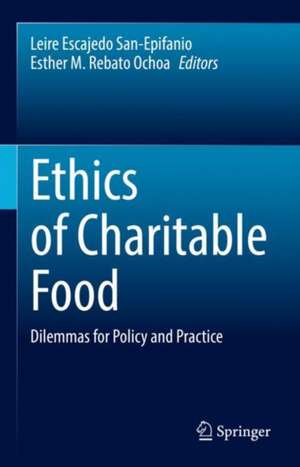Ethics of Charitable Food: Dilemmas for Policy and Practice
Editat de Leire Escajedo San-Epifanio, Esther M. Rebato Ochoaen Limba Engleză Hardback – 11 mai 2022
| Toate formatele și edițiile | Preț | Express |
|---|---|---|
| Paperback (1) | 721.51 lei 43-57 zile | |
| Springer International Publishing – 12 mai 2023 | 721.51 lei 43-57 zile | |
| Hardback (1) | 690.48 lei 22-36 zile | +19.50 lei 6-12 zile |
| Springer International Publishing – 11 mai 2022 | 690.48 lei 22-36 zile | +19.50 lei 6-12 zile |
Preț: 690.48 lei
Preț vechi: 863.10 lei
-20% Nou
Puncte Express: 1036
Preț estimativ în valută:
132.16€ • 143.61$ • 111.09£
132.16€ • 143.61$ • 111.09£
Carte disponibilă
Livrare economică 31 martie-14 aprilie
Livrare express 15-21 martie pentru 29.49 lei
Preluare comenzi: 021 569.72.76
Specificații
ISBN-13: 9783030935993
ISBN-10: 303093599X
Pagini: 172
Ilustrații: X, 172 p. 1 illus.
Dimensiuni: 155 x 235 x 18 mm
Greutate: 0.44 kg
Ediția:1st ed. 2022
Editura: Springer International Publishing
Colecția Springer
Locul publicării:Cham, Switzerland
ISBN-10: 303093599X
Pagini: 172
Ilustrații: X, 172 p. 1 illus.
Dimensiuni: 155 x 235 x 18 mm
Greutate: 0.44 kg
Ediția:1st ed. 2022
Editura: Springer International Publishing
Colecția Springer
Locul publicării:Cham, Switzerland
Cuprins
1. Old and New Dilemmas around Charitable food. Promoting reflection on (some) policies and practices.- 2. When opulence can no longer hide hunger: International politics, welfare policies and the need to take action.- 3. Ethical debates on global hunger: moral obligations to the distant other and global justice.- 4. Food sharing and altruism: reconstructing the behavioural evolution.- 5. The right to food and the essential promotion of personal autonomy: the ‘how’ matters.- 6. Food sharing in religious and indigenous traditions: Drawing inspirations for contemporary food ethics and politics.- 7. Criminalising the poverty: stigma of the social inequalities within the constitutional framework of the workfare state of the Union.- 8. Other ways of eating in spain: Food itineraries in a context of increasing precarization.- 9. Clash between some kinds of charitable food and the human right to food.- 10. The Corporatization of Food Charity inCanada: Implications for Domestic Hunger, Poverty Reduction and Public Policy.
Notă biografică
Leire Escajedo San-Epifanio completed her education as associate researcher at the Inter-University Chair in Law and the Human Genome (1997-2010) and with two research stays, in 1998 and 1999 at the Max Planck Institute of Freiburg of Brisgovia (Germany). As Associate Profesor, she visited the Max Planck Institute for Public Law in Heidelberg (2008) and the Freiburg--Switzerland Institute of Federalism (2009). She has also visited the Institute of Advanced Legal Studies (London, 2013) EURAC Academy of Bozen (Italy, 2014), Max Planck Institüt für Sozialrecht und Sozialpolitik (2016) and the Max Planck Institute for Public Law (2012, 2015).
Esther Rebato began his university teaching activity in 1985. Since then he has participated in the teaching of the subjects of Physical Anthropology, Primatology (extinguished) and FBA (Anthropology) of the Biology degree. She has taught 3rd cycle in various Doctoral Programs (1987-2009), and abroad (TS mobility, since 2000-present), as well as in the JAKITEZ interactive course from its first edition to the last (2000-2001 / 2006-2007). She participates as a teacher in a degree UPV-EHU, UNED and EI-SEV (since 2007-present), and in the Master's Degree in Nutrition and Health (2009-2010 academic year).
Textul de pe ultima copertă
This book provides an in-depth analysis of different dimensions of contemporary food charity. It does so against the background of an increasing number of food banks and other forms of food philanthropy. The book examines the incongruity of considering food donation as an expression of 'pure altruism'. Taking into account the dignity and rights of people, it addresses how hunger is seen and explained in rich countries and how philanthropy and democracy coexist. It looks at the relationship that exists between religious traditions and the current food donation narrative. It discusses the risks of stigmatizing food recipients, and clarifies ways to better deal with food poverty and food waste. Paradoxically, food insecurity and food waste have grown exponentially in the last decade. More and more people are not able to access food properly. The amount of perfectly edible food that is discarded also grows. The consolidation of democracies, welfare policies, and economic growth do not guarantee that all citizens can meet their basic needs in the so-called rich countries. This book analyses the current state of affairs and presents facts and reflections from diverse sources and from a cross-disciplinary perspective.
Caracteristici
Reflects on the many faces and narratives around contemporary food donation Offers a cross-sectional analysis covering a wide time span Perceives charitable food from different viewpoints
